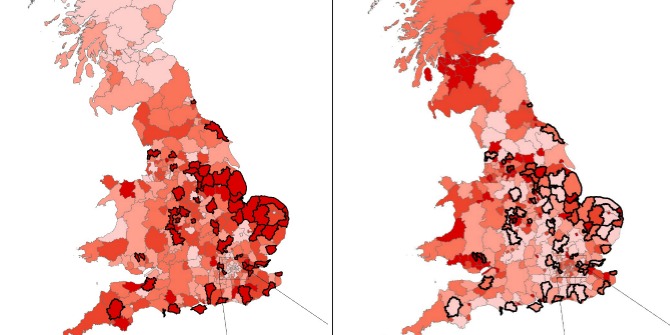
 There is an urgent need to move beyond a nineteenth century set of ideas about democracy and governance – the so-called British Political Tradition – that should by now have long been consigned to history, write Dave Richards and Martin Smith. The Conservatives, however, may use their slim majority and narrow electoral base to veto any real changes.
There is an urgent need to move beyond a nineteenth century set of ideas about democracy and governance – the so-called British Political Tradition – that should by now have long been consigned to history, write Dave Richards and Martin Smith. The Conservatives, however, may use their slim majority and narrow electoral base to veto any real changes.
The 2015 general election was supposed to produce one type of policy earthquake but may have produced another. The assumption by nearly everyone up until 10.01 p.m on May 7th was that we would see the further embedding of multi-party government in the UK with either a minority Labour government or some type of coalition. Instead, what we saw was the collapse of the traditional opposition parties. The Liberal Democrats wiped out across the UK and Labour devastated in its Scottish homeland. Single party government was recovered as the principle mode of British government and David Cameron has stated on a number of occasions that he now has a mandate to implement the Conservative party manifesto in full.
On one hand, the election can be seen as a reaffirmation of the British political tradition (BPT). This is the idea, in existence – at least since the time of Disraeli – that Britain has a limited conception of democracy based on a conservative notion of responsibility, accountability to parliament, and an emphasis on consistency, prudence and leadership (Birch 1964), non-ideological pragmatism (Oakeshott 1962), and strong, seamless government (Beer 1965). Its prescribed mode of governance, that of the Westminster Model, highlighted the unitary character of the British Parliamentary State, organised round the principle of parliamentary sovereignty. In so doing, it delivered an elitist form of top-down government, based on a high concentration of power at the centre, what Brian Barry caustically referred to as a ‘power-hoarding’ approach to governing.
As the dust settles on the aftermath of the outcome of the May 2015 election, more than ever both the ideas and the (in)formal rules of the game that were part and parcel of the BPT, appear an inappropriate, anachronistic throwback to an age of politics now long gone. In 1997, Tony Blair spoke of a need for a ‘New Politics’, of the need to restore trust in the political system, devolve power and decentralise, sentiments repeated in 2010 by both David Cameron and Nick Clegg. Cameron went as far as to suggest that electors had been:
“…betrayed by a generation of politicians, by an elite that thinks it knows best. People have lost control. The politicians have forgotten, the public are the master, we are the servant. That’s what needs to change in our system… Overthrow the old ways. Put people in the driving seat.”
Yet, beyond the rhetoric, the last twenty years has seen the Westminster class reluctant to address wholesale constitutional reform by redesigning the Westminster model and abandoning the BPT. The British way of ad hocery, a penchant for grafting reform onto the existing model has held sway.
One of the ironies of the 2015 election is that many people voted for the anti-Westminster parties UKIP, Greens and SNP but over 5 million of them were left without any representation. The election reinforced those cynical about Westminster that voting does not change anything. This is just one of the many disruptive issues to arise from the election. A list of the key pinch points is extensive but would certainly include: the increasing schism across the Union, particularly north of the Border; the commitment to devolution in England based on a ‘City’s Model’, alongside a tacit agreement to move towards a more federalist settlement to accommodate English votes for English laws; the proposal for a new Bill of Rights to replace the European Convention on Human Rights; the possibility of an exit from the European Union; the unfinished business of House of Lords reform; and the suitability of a majoritarian electoral system in an emergent age of multi-party politics.
In addition, as we suggested, the Conservative majority has led them to think they can ignore the rising ‘anti-politics’ seam in British public life, covering a multiplicity of themes concerning power, legitimacy, participation and accountability, often popularly distilled in the now familiar rhetorical retort of an ‘out-of-touch Westminster elite operating in its own bubble’. As we have previously argued: ‘Discussion of the devolution process should come with a debate around the electoral systems, the role of the civil service, the power of Whitehall and Westminster and fundamentally what sort of democracy does Britain want to have in the twenty-first century.’ Central to the debate is the pressing need for joined-up thinking on the constitutional implications of reform, not a further bout of ad hocery.
So are we in the midst of witnessing the slow death of the British Political Tradition? Some caution here is needed. The BPT has been a deeply embedded fixture shaping the political landscape for well over 150 years and there are potentially high political costs involved in abandoning it. The power it offers the Westminster political class and the extent to which its actors have been thoroughly socialised by its ways and means, explains their reluctance to travel down alternative pathways.
It may well be that events themselves, most obviously in the form of Scotland removing itself from the Union, throw up a critical juncture challenging the long-term viability of the BPT and so demanding a new constitutional settlement. Yet such an eventuality, may also bring with it the emergence in England of a bowdlerised reinvention in the guise of an English Political Tradition, not discernibly different to its British predecessor. If that were to be the case, there is the danger of witnessing the recasting of the same sets of pressures and pathologies that currently afflict our present times.
There is an urgent need to move beyond a nineteenth century set of ideas about democracy and governance that should by now have long been consigned to history. The irony is that the Conservatives may use their slim majority and narrow electoral base to veto any real changes.
Note: This article gives the views of the authors, and not the position of the British Politics and Policy blog, nor of the London School of Economics. Please read our comments policy before posting.
 Dave Richards is Professor of Public Policy at the University of Manchester.
Dave Richards is Professor of Public Policy at the University of Manchester.
 Martin Smith is Anniversary Professor of Politics in the Department of Politics at the University of York.
Martin Smith is Anniversary Professor of Politics in the Department of Politics at the University of York.








4 Comments